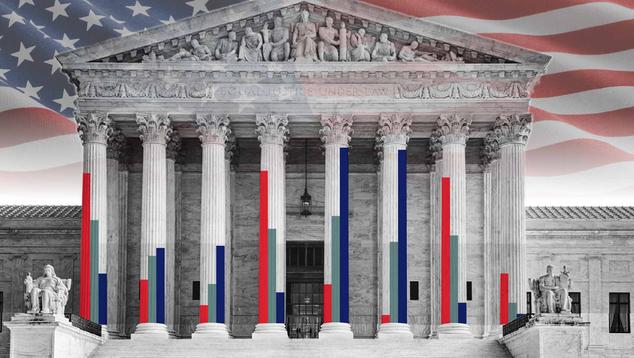WASHINGTON, D.C. -- Americans’ evaluations of the U.S. Supreme Court remain near historical lows as the institution prepares to begin its 2024-2025 term. Depressed ratings of the high court are driven largely by exceedingly low trust (24%) and job approval (15%) among Democrats. These low ratings have contributed to a record 47-percentage-point party gap in trust in the federal judicial branch and near-record 57-point gap in Supreme Court job approval.
Democrats’ frustrations with the Supreme Court lie in their belief, held by 82%, that the Supreme Court is “too conservative.” Meanwhile, 69% of Republicans believe the court’s political leanings are “about right.”
The latest results are from Gallup’s annual Governance survey, conducted Sept. 3-15. The U.S. Supreme Court has had a generally reliable 6-3 conservative majority after President Donald Trump nominated and the U.S. Senate confirmed Amy Coney Barrett to replace Ruth Bader Ginsburg in 2020. Since September 2021, the court has allowed states to implement restrictive abortion laws, and its job approval ratings and public trust ratings have established record lows. In recent years, there has been no meaningful recovery in the court’s image.
Trust in the Judicial Branch
At 48%, the proportion of Americans who have a great deal or fair amount of trust in the federal government’s judicial branch is statistically similar to the 2022 record low (47%) and 2023 (49%) ratings. Before 2022, trust in the judicial branch had never been below the majority level and typically exceeded 60%.
The 13-point decline in trust that occurred between 2020 and 2021 followed Barrett’s confirmation to the Supreme Court and its decision to allow a strict Texas abortion law to stand. The seven-point drop from 2021 to 2022 came after the court handed down the Dobbs decision that overturned Roe v. Wade’s finding of constitutional protections for abortion rights.
While Democrats have led the decline in judicial branch trust with a 34-point decrease since 2020 (from 58% to 24%), all party groups are less trusting now than in 2020. Trust is down 14 points among independents (to 49%) and 13 points (to 71%) among Republicans during this time. While Republicans’ level of trust remains lower than in 2020, it did improve by eight points in the past year.
The slight improvement in Republicans’ trust in the judicial branch this year combined with Democrats’ trust falling to a new low -- for any party -- has opened up a record 47-point party gap between the two major parties.
More Democrats now say they have no trust at all in the judicial branch (37%) than say they have a great deal or fair amount of trust in it.
Supreme Court Job Approval
Approval of the job the Supreme Court is doing has been stuck in the low 40s since September 2021. Currently, 44% of Americans approve and 51% disapprove of the court. Approval has been at a historical-low 40% in three recent polls -- September 2021, September 2022 and July 2023.
Gallup’s Supreme Court job approval trend dates back to 2000. Before 2021, Gallup measured low approval for the Supreme Court in June 2005 (42%), July 2013 (43%) and July 2016 (42%), all coming after various controversial decisions.
The high points in job approval were 62% readings recorded in September 2000 and June 2001.
Currently, 57 points separate the approval ratings of Republicans (72%) and Democrats (15%), representing the second-largest party gap in Gallup’s trend. The largest was 61 points in July 2022, weeks after the court issued the Dobbs decision, when 74% of Republicans and 13% of Democrats approved.
The past three years represent a departure from the typical pattern in ratings by political party. For most of George W. Bush’s 2001-2008 and Trump’s 2017-2020 presidencies, Republicans were more likely to approve of the Supreme Court than Democrats were. And during most of Barack Obama’s 2009-2016 presidency, Democrats were more approving. But during Joe Biden’s presidency, Republicans have been more approving of the conservative-leaning court.
Republicans’ low point in Supreme Court job approval, 18%, came in July 2015, after rulings that legalized same-sex marriage nationwide and upheld federal subsidies for health insurance under the Affordable Care Act.
Perceptions of the Court’s Political Leanings
For most of the 31 years in which Gallup has asked Americans to describe the Supreme Court’s political leanings, the plurality of respondents, typically above 40%, have said they are “about right.” However, in the past four years, roughly as many Americans have said the court is “too conservative” as said it is about right. This includes a record 42% saying the court is too conservative in 2022.
Currently, 41% of U.S. adults describe the court’s ideology as “too conservative,” with an equal 41% saying it is “about right” and 13% “too liberal.”
The highs in perceptions of the court as too liberal occurred in 2015 and 2016.
The vast majority of Democrats, 82%, describe the Supreme Court as too conservative. This represents a new high, up from 73% a year ago and 66% in 2021.
Thirty-nine percent of independents believe the Supreme Court is too conservative, while 42% say it is about right and 10% too liberal.
Meanwhile, 69% of Republicans, a new high for that group, believe the Supreme Court is about right. Just 4% of Republicans believe the court is too conservative, and 24% say it is too liberal.
Implications
As it prepares to start a new term, the Supreme Court continues to suffer from a loss of public faith, registering near-record-low trust and job approval. Much of the frustration is being felt by Democrats. While independents are not nearly as critical of the Supreme Court as Democrats are, their trust and approval ratings are also in the lower range for that group. And while Republicans’ approval ratings are high, they are significantly less likely to say they trust federal courts than they were in 2020.
In addition to a series of recent rulings that upended precedents on abortion rights, voting rights, and affirmative action, the court has also been plagued by ethics questions surrounding multiple justices.
Prominent Democratic elected officials, including Biden and Sen. Ron Wyden, have released various proposals aimed at rebalancing or reforming the Supreme Court. Some of these proposals would tighten ethics requirements for justices, institute term limits for them or expand the membership of the court. Those proposals are unlikely to pass, given a lack of Republican support, but they do underscore the point that the Supreme Court has become a political issue and one that could influence voter decisions in this year’s presidential and Senate elections.
To stay up to date with the latest Gallup News insights and updates, follow us on X @Gallup.
Learn more about how the Gallup Poll Social Series works.
View complete question responses and trends (PDF download).





